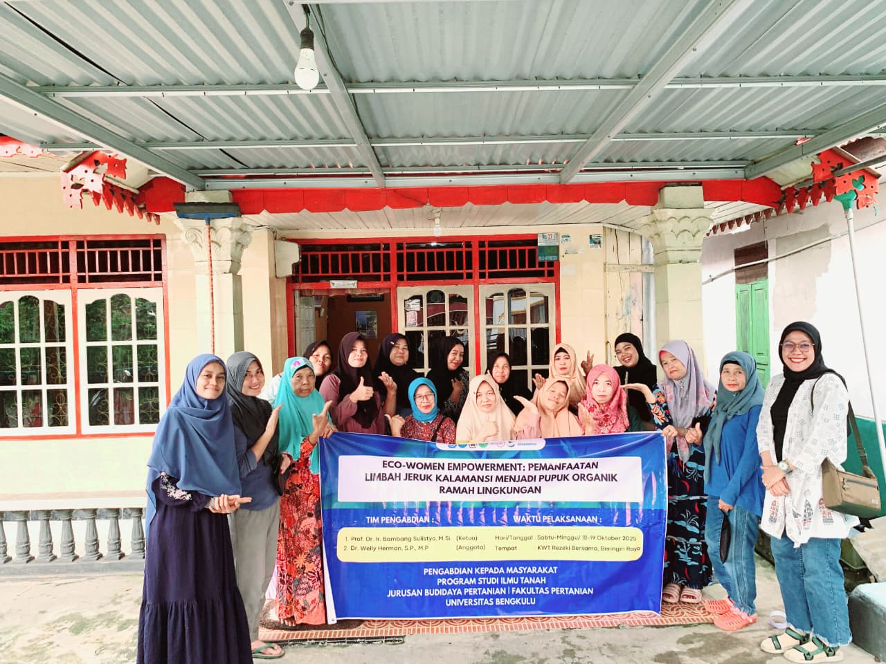Lecturers from the Soil Science Program, Faculty of Agriculture, University of Bengkulu, Encourage Women’s Empowerment Through the Utilisation of Kalamansi Orange Waste

Bengkulu, October 18, 2025 — A team of lecturers from the Soil Science Program, Faculty of Agriculture, University of Bengkulu, consisting of Prof. Dr Ir. Bambang Sulistyo, M.Si., and Dr Welly Herman, S.P., M.P., conducted a community service activity (PKM) themed “Eco-Women Empowerment: Transforming Kalamansi Orange Waste into Sustainable Organic Fertiliser” in Beringin Raya Village, Bengkulu City.
This program aims to empower women’s groups by managing Kalamansi orange peel and pulp waste, which has previously been underutilised. Using a participatory approach, the community service team encouraged the “Rezeki Bersama” Women Farmers Group (KWT) to innovate by processing this waste into an environmentally friendly, economically valuable liquid organic fertiliser.
According to Dr Welly Herman, this activity arose from the accumulation of Kalamansi orange waste in the Beringin Raya area. “We want to change people’s perspectives on waste. Kalamansi peels and pulp actually have great potential to be processed into organic fertilizer that benefits agriculture and the family economy,” he said.
Twenty-five KWT members actively participated in this activity. The activity included outreach, interactive discussions, and a live demonstration of liquid organic fertiliser production based on circular economy principles. Participants demonstrated high enthusiasm, with many questions and ideas emerging throughout the training, particularly regarding applying simple technology for household waste processing. Evaluation results showed a significant increase in participant knowledge, from only 28% understanding kalamansi waste management before the training to 84% after the training. Furthermore, 92% of participants found the activity beneficial and proposed further training to develop organic fertiliser-based businesses.
The Eco-Women Empowerment Program provides technical benefits and strengthens women’s roles as agents of change in sustainable development. Through this activity, women in Beringin Raya Village are encouraged to become more empowered in their families’ environmental, social, and economic aspects.
Furthermore, this activity supports the achievement of the Sustainable Development Goals (SDGs), specifically: SDG 5 – Gender equality and women’s empowerment, SDG 12 – Responsible consumption and production, and SDG 13 – Addressing climate change.
“Going forward, we will continue to assist women’s groups in developing independent organic fertilizer businesses. We hope this activity will be the starting point for the formation of an environmentally friendly local economy,” added Dr Welly Herman.
This activity received full support from the Faculty of Agriculture, University of Bengkulu, the Beringin Raya Village Government, and the local community. This multi-stakeholder collaboration is expected to become a model for environmentally-based women’s empowerment that can be replicated in other regions in Bengkulu Province and throughout Indonesia.